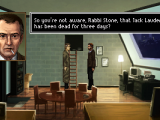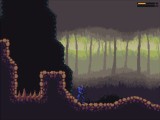 In many ways, Dave Gilbert’s adventure game The Shivah, now re-released and re-mastered under the “Kosher Edition” subtitle on Steam and on the iPad, is a game of firsts.
In many ways, Dave Gilbert’s adventure game The Shivah, now re-released and re-mastered under the “Kosher Edition” subtitle on Steam and on the iPad, is a game of firsts.
Released originally in 2006, it was Gilbert’s first commercial game 1)Curiously, the game was not a commercially-minded title at first; the original version was in fact a MAGS contest submission that was then reworked – much like the Kosher Edition!, and, in fact, one of the first commercial Adventure Game Studio games on the whole. It’s also where his publishing studio, Wadjet Eye Games, got kickstarted (in a time before Kickstarter). Though the developer had already released other games, for free, like The Repossesser (2001), and Bestowers of Eternity (2003), the game that later became The Blackwell Legacy, it was this game that would become his calling card.
After all, The Shivah was the first AGS game to receive any real mainstream coverage, perhaps in large part due to its mundane, real-world setting, and Gilbert’s writing chops. Some readers may still recall, for instance, Boing Boing’s early snippet of an article on the game. Imagine: This miniature mention was – by far! – the most coverage that the AGS platform had received since its inception in 1999!
And as far as firsts go, it was – quite probably – the first game with a rabbi as its lead. (more…)
References
| 1. | ↑ | Curiously, the game was not a commercially-minded title at first; the original version was in fact a MAGS contest submission that was then reworked – much like the Kosher Edition! |
